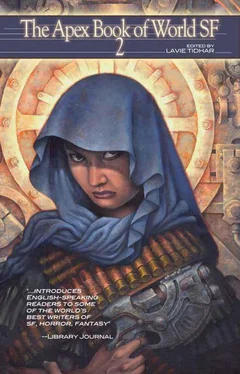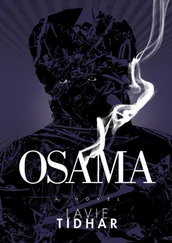There was a massacre, with the slaughter and sodomisation of unarmed men in the process of surrendering.
“Most of my villagers allowed this, encouraged it even, but I objected. My shadow wished to continue, but I tried to prevent it. It tried to turn on me, but I fought it off. It hissed and sputtered and slinked away, and I did not see it again before sundown. I have not cast a shadow since. It made my wife and family uncomfortable and I had heard of the Mamman here. I loaded provisions, left my kinsmen, and here I am.”
The Mamman was silent for a long time. Then she scratched herself absently. Our shadows flickered in the candlelight, with an eerie gap where the stranger’s should have been.
“It’s not such a bad thing to lack a shadow-self,” she said.
“Then give me yours,” said the man.
The Mamman laughed. It sounded like many jackals at once, and her spittle sprayed around. I dared not wipe it off my chin. The woman stood and crumbs of something dropped to the floor. “There are two ways of solving this problem. We can find your errant shadow or take one from a recently-deceased person. The latter will not look like you and may not move at exactly the same moment as you, but nobody will notice who doesn’t observe closely. Choose wisely.”
This is how I came to be a resurrectionist, digging into the grave of one Saliu Ogunrombi, who had died in the last wave of Yellow Fever.
There was no moon. There was the rhythmic digging of myself and the man with no shadow. The Mamman sat on a stool, waiting, smoking.
The ritual itself was undramatic, and consisted of holding Saliu upright and lighting torches behind him. The Mamman said something to the resultant shadow and it detached from Saliu and bobbed over to the stranger.
At dawn, I settled at my wife’s side, freshly showered and with no intention of doing the day’s hunting. Her hand drifted between my legs, but grave digging is tiring work and there was no oak tree for her to climb, just a willow.
Before I fell asleep I remembered the last words the Mamman had said to me, as the man walked away with his new shadow.
“In a year he will return to us. To me. He will tell me to release him from this shadow.”
“Why?” I asked.
“He will say his wife has left him and the people of his village shun him. He will say the new shadow-self has changed his behaviour and he cannot control himself.”
I said nothing.
“And he will be right.”
“What is a shadow, Ma?” I asked. I did not stutter when with her.
She did not answer, but walked into the twilight. Presently, I had gone home.
I looked at the walls of my bedroom, at the shadows receding with the rising sun, and the rise and fall of my wife’s chest.
I slept.
Shibuya no Love
Hannu Rajaniemi
Hannu Rajaniemi’s first novel, The Quantum Thief , has been hailed as “brilliant” by John Clute and he has been called the best new hard SF writer to emerge in recent years. Two more novels are forthcoming. A Finn, Rajaniemi currently lives in Edinburgh. He holds a PhD in string theory, and is the director and co-founder of ThinkTank Maths.
They were eating takoyaki by the statue of Hachiko the dog when Norie told her to buy a quantum lovegety.
Riina’s Japanese was not very good in spite of two years of Oriental Studies and three months in Tokyo, and the translation software on her phone did not immediately recognise the term, so she just stared at the small caramel-skinned girl blankly for a few seconds, mouth full of fried dough and octopus. “A what?” she managed finally, wiping crumbs from her lips.
Norie, who sat on the edge of the fountain and dangled her impossibly tanned legs in the air, giggled.
“You don’t have them in Finland? How do you meet boys there? Oh, I forgot, you have the sauna!”
“It’s not a—” Riina stopped. The concept of non-erotic unisex nudity in a steamy room was something only her Canadian friends had grasped so far. “Never mind. Tell me about the lovegety.”
“It’s the most kawaii thing! I keep mine on all the time. Look!” Norie held up her wrist. Her phone was embedded in a Cartier platinum bracelet with a jewel-studded Hello Kitty engraving that her boyfriend Shinichi had given her for her birthday. Riina had admired it several times, but had not paid attention to the little teardrop-shaped plastic thing dangling from it until now. It was hardly bigger than the tip of her index finger, and its pink surface had the characteristic Teflon sheen of a nanovat-grown product. There was a silvery heart-shaped logo on one side.
“They had these already when my mother was a schoolgirl—that’s how she met my father! Then they went out of fashion for several years, but now there is this crazy otak in Akihabara making new and better ones. Quantum versions. Everybody has one!”
“So, what does it do?”
“I can’t tell you—you have to try it! C’mon, let’s go-find you one!” Norie leaped up, took Riina’s hand in her own and tugged her towards the techno beat of Shibuya and District 109 that was its heart. A forest of orange hairdos, brown legs and spidery eyelashes swallowed the girls. There was a crowd around the statue: it was one of the few clear landmarks in the district, and tourists loved the story of the dog who waited for its master for years after his death.
Riina hesitated. Norie tended to assume that she was equally good at assimilating the new memes that boiled up from the teenage paradise of Shibuya as her Japanese friends, who seemed to be able to turn the latest otaku toy into a subculture or a fashion statement in a matter of minutes. She was starting to become desensitised to future shock, but the labyrinths of the new and the old in this country still confused her. She wondered how her father managed: good protocol/etiquette software, probably. It was simply impossible to figure out the right kind of bow, the correct form of address towards a senior or a superior.
Let alone get a date.
She sighed and allowed Norie to tow her deeper into the crowd. The Japanese girl’s neon-rimmed eyes were bright, and her small white teeth were flashing, her canary-yellow backpack bopping up and down.
“Seriously—lovegetys are sooo kawaii!”
The boy looked like a painted little satyr: silver lips and eyelids, orange ash-streaked hair and a heavy gold chain around his neck. He couldn’t have been older than twelve, but then, in Shibuya, a fifteen-year-old was ancient and venerable. The drone of the base beat that seemed to permeate everything in 109 obscured the rapid-fire exchange between Norie and the boy, but it wasn’t long before he smiled hungrily and held his palm out towards Riina, the little pink thing bright against his dark skin like a tiny flower. She took it, and it was still warm from the boy’s hand, a living thing almost. Her MasterCard thumbnail sang an inaudible song to the boy’s account, and suddenly she was the proud owner of a quantum lovegety.
Norie gave her a nymph-like smirk as the satyr-boy vanished into the seething mass of Japan’s young around them.
“Now comes the best part. We go to Starbucks, and you get to try it out!”
Most of Shibuya was like a graffiti: clashing, bright, screaming colours over a drab concrete surface, the clothes shops and holograms and neon signs and rainbow crowds, a stark contrast to the utilitarian 90s architecture. Starbucks was an exception—an intricate, cylindrical two-storey glass monstrosity, a ten-metre hologram of the white-green all-seeing mermaid hovering above it.
The girls sat at a small table on the second floor, sipping cardboard-flavoured cappuccinos. Norie helped Riina to calibrate the lovegety: it talked to her old Nokia toothphone eagerly, a little light blinking in the centre of the silver heart. Menus with swirling Japanese characters danced on her retina, barely comprehensible. “Get2 setting? What is that?”
Читать дальше












